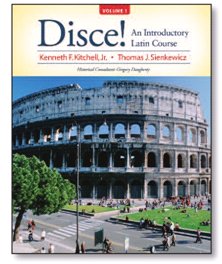- Paperback: 2010
- Publisher: Pearson)
- Language: Latin
- ISBN:
Fall, 2010 The general aim of this course is to improve your Latin reading and comprehension skills and to expose you to a variety of texts in Latin. The specific goal of the course this semester is to read the lectiones from Disce!. Class will meet about 50 minutes per week. During this time we will translate, discuss
and interpret the assigned readings. You are expected to come prepared to every class.
Preparation means review of the reading from last class and work on the reading for the
next class. Your course grade will be based upon your daily class performance and upon an ORAL final examination. You can request a verbal evaluation of your performance at any time during the term. In general, you will be graded in this course based upon the "3 P's" of PREPARATION, PARTICIPATION, and PROGRESS. About the instructor / Some Useful Websites on the Latin language / Class Photo
It is highly recommended that students also have their own Latin dictionaries and a Latin reference grammar. Students enrolled in LATN240/340/440 should also consult the list of required texts for CLAS/HIST240. A word on academic honesty: You are encouraged to work with other members of the class. However, please do not try to recite another's translation. This is a form of plagiarism (copying someone else's work without giving credit) which is both dishonest and ineffective for your goal of reading Latin. At Monmouth College we
view academic dishonesty as a threat to the integrity and intellectual mission
of our institution. Any breach of the academic honesty policy Ė either
intentionally or unintentionally - will be taken seriously and may result not
only in failure in the course, but in suspension or expulsion from the college.
It is each studentís responsibility to read, understand and comply with the
general academic honesty policy at Monmouth College, as defined in the Scots
Guide (http://department.monm.edu/stuserv/student-handbook/academic.htm)
and to the specific guidelines for each course, as elaborated on the
professorís syllabus. This webpage was prepared by Professor Thomas J. Sienkewicz of Monmouth College. If you have any questions, you can contact him at toms@monm.edu. |
||||||||||||
